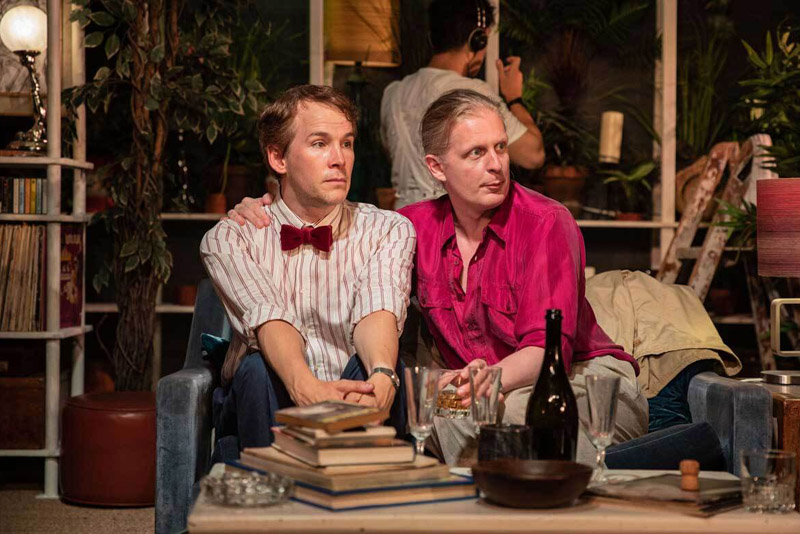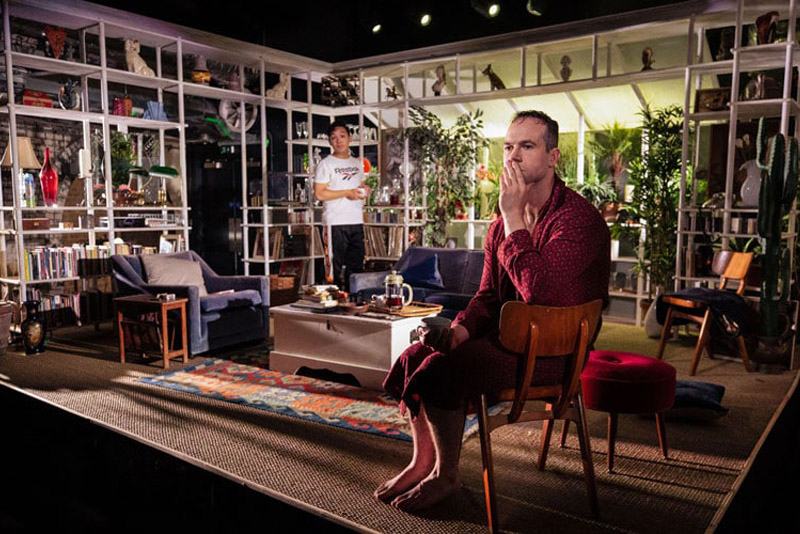“My Night With Reg”: Turbine Theatre, Battersea
Jef Hall-Flavin in south London
31 July 2021
Hearing the song “Wrapped Around Your Finger” as I was coming down a long hallway under the railway arches that house Battersea’s Turbine Theatre immediately brought me back to the 1980s. In my seat I found myself staring at a stylish living room with a plant-filled glasshouse over the terrace designed by Lee Newby as “Every Breath You Take” started playing.

Paul Keating and Gerard McCarthy in My Night With Reg.
Photo credit: Mark Senior.
Glad to be in a theatre in the midst of a long pandemic, I was hoping the evening’s revival of Kevin Elyot’s 1994 comedy My Night with Reg would spark what The Police’s album promised: synchronicity. Unfortunately, this stodgy and needless revival was out of sync.
What distinguishes My Night with Reg from other AIDS-era plays is that the subject isn’t AIDS itself. Rather, it’s about redefining fidelity in the face of unrequited love. In fact, I can’t find the word AIDS in the script, although its effect is everywhere – like gravity. This play captures the 1980s zeitgeist without the heavy-handedness that characterizes its more raw and tragic cousins like Larry Kramer’s The Normal Heart (which the National Theatre is staging this autumn). By contrast, this award-winning 1990s comedy was written just as the first successful drug “cocktails” began making HIV a manageable illness, and a decade of distance from its 1985 setting give it what comedies need: tragedy plus time. But director Matthew Ryan’s production takes it too seriously, and it lacks the light touch and sharp point of view – the distance, if you will – required of comedy.

Stephen K. Amos in My Night With Reg. Photo credit: Mark Senior.
With slow pacing, actors that telegraph the tragic end of the play right from the beginning, and a stodginess to the onstage relationships that somehow prevented me from caring about them, the production failed to convince me this play is worth reviving at all. With his sharp wit and buoyant presence, actor Gerard McCarthy makes a herculean effort as Daniel to bring some life to the proceedings with his quick quips. But one actor’s comedic timing couldn’t cut through the overly sincere bonanza of sad sacks who people most of the scenes. The script doesn’t help matters, as no attempt is made to hide the exposition; it would have required speed, agility, and panache to pull off the early scenes without sounding clunky. At one point, the expository scenes came across to me like people re-learning how to socialize after being in lockdown for months on end. There was a lack of surety and confidence from the cast, especially newcomer James Bradwell as Eric with an uneven Birmingham accent. Try as the actors might, it felt as if none of the characters actually knew each other, leaving the box un-ticked for the most basic of acting tasks: believability.
The play takes place in Guy’s flat; he is a hopeless romantic in the form of a repressed homebody. In a series of gatherings of Guy’s friends, a web of relationships unfolds so that we find that Guy (Paul Keating) is in love with John (Edward M. Corrie), who’s in love with Reg, who’s dating Daniel. Or something like it. The titular character is never seen, though it seems nearly everyone on the stage has had a (not so) secret tryst with the promiscuous Reg. Hilarity ensues? Not quite, as the life-and-death stakes of having sex in the eighties puncture the proceedings with two funerals, including Guy’s. If the stakes had been ratcheted up on stage at the Turbine, I may have been able to care about the characters’ travails; however, I suspect that Elyot’s play may have outlived its context. In a Grindr culture of instant gratification and open relationships, one has to first re-imagine a time when such things as promiscuity were titillating, then re-imagine a time when this now predictable play was edgy, slightly transgressive, and therefore funny.

James Bradwell and Edward M Corrie in My Night With Reg. Photo credit: Mark Senior.
Perhaps Rachel Sampley was trying to help matters with her lighting design, but the inexplicable changes in intensity, going from bright, to supernova, and back again, only confused and distracted. There were plenty of lamps all over the set, and yet somehow the light was unfocused, with the net effect of a hothouse in summer rather than a flat in grey London. As distracting as the lighting was, Newby’s costumes did the opposite, so that their very non-descriptiveness failed to draw clear distinctions between the characters. In what is meant to be a comedy, he missed an opportunity to sharpen the campy quirks each of the gay men bring to the party.
Being nude on stage takes a certain amount of bravery, and this play has a casual nude scene between men, which was perhaps ground-breaking before we had easy access to the internet and gay marriage. But instead of a matter-of-fact portrayal of two horny, grieving gay men, the scene was directed portentously, as if to say, “I am now going to take off my clothes, aren’t I brave!” This is but one example of the way the production’s thick layer of seriousness choked its joy.
Moreover, I couldn’t find any connection to the here and now through the lens of what’s meant to be (according to the programme essay) Britain’s “homegrown answer to Angels in America”. If the director’s goal was filling the audience with nostalgia, the production failed to do so in its blandness. If the goal was to compare our current fear of Covid with the fear of AIDS, that wasn’t made clear. If the goal was simply to tell a funny, believable, touching story, the production failed to deliver. The muddy point of view of this production succeeded only in solidifying for me that a good revival must have a good reason for being revived.









